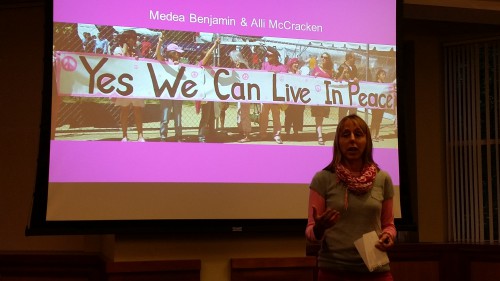By Alexa Gagosz
“Yes we can live in peace,” is the promise the organization “CODEPINK” lives by as they urge women across the country to rise up and oppose global militarism.
Originally, the organization emerged out of the deep desire from a group of American women with a sentiment to stop the US from invading Iraq. Now known nationwide, Medea Benjamin, the cofounder of both CODEPINK and the international human rights organization Global Exchange, travels across the country to speak to universities. Last Wednesday, she came to Suffolk with Alli McCracken, her associate, following a trip to Iran.
She is an activist and an author of eight published books. In addition, she is currently working on her campaign to stop the use of killer drones.
In the forum, Benjamin spoke about her direct questioning of President Barack Obama in the 2013 foreign policy address, as well as her recent trips to Pakistan and Yemen, which helped her inform others about the innocent people being killed by U.S. drone strikes.

“As President Obama was speaking about a year and a half ago when he was giving his foreign policy talk, I don’t tell anyone how I did it, but I managed to get inside of there when we were working on drones. The US was lying to the people, first saying that we weren’t using them, and secondly, they were saying that they weren’t killing civilians,” Benjamin said at the forum. “Now Alli and I have been to Pakistan and Yemen and met with families whose loved ones were killed. We knew our government was lying.”
Benjamin then talked of the prisoners still being held by the CIA in Guantanamo Bay detention camp, the U.S. military prison located in Cuba, for the past 12 years now after they were cleared for release already.
Benjamin claimed that organizations including the CIA, FBI, and NSA have said the prisoners are not guilty, but have yet to be released.
“So here I was, and the president was speaking. Now we heard because of the media buzz that he was going to announce some major policy changes. The entire speech he didn’t say anything about any changes so when he said, ‘now the last thing I want to talk about,’ I knew that he wasn’t going to talk about Guantanamo. So I stood up and I said, ‘you are the commander-in-chief, you could release all the cleared prisoners from Guantanamo immediately,’” Benjamin said, describing her presence at the foreign policy address.
She said that at first, Obama attempted to ignore her as there were “badges being flown around me everywhere ready to kick me out.”
But, after a while, she said that he started to engage with her.
Obama said to the audience that her points were clear and true, that they should listen to her; yet even with the president’s support, she was thrown out of the address for questioning the President’s authority.
Benjamin spoke about her personal history in protesting and challenging the government’s decisions. She said she found it sad that young people nowadays live in fear instead of acting out or questioning authority like her generation did in the 1960s.
“In this country, people are always saying that there are such awful things going on,” Benjamin said. “And yes, it’s terrible that the NSA are spying on people, that the police are killing people who are unarmed, but we also have to remember that in this country we have a lot of liberties. And we should use them. Or else they get taken away more and more.”







